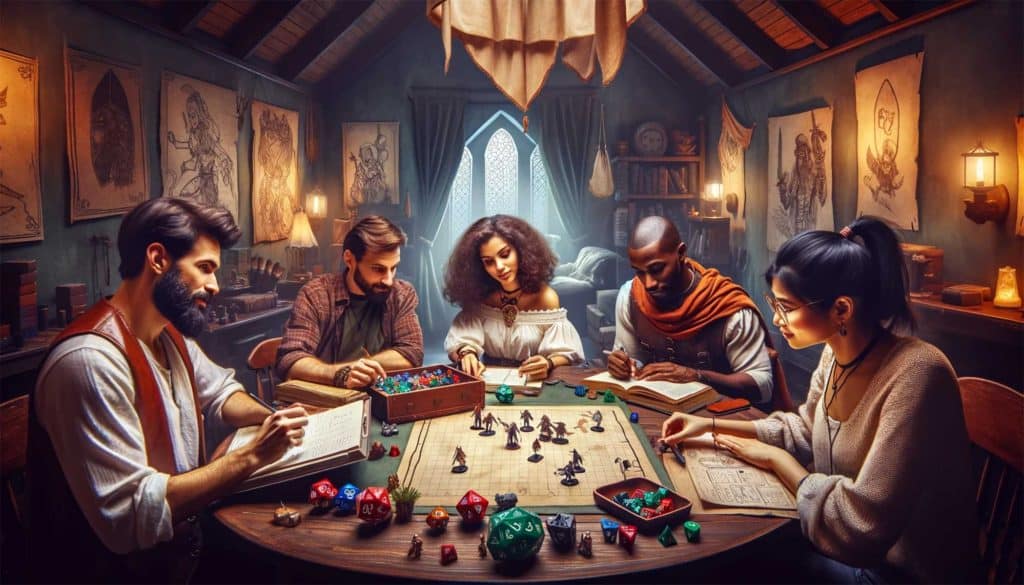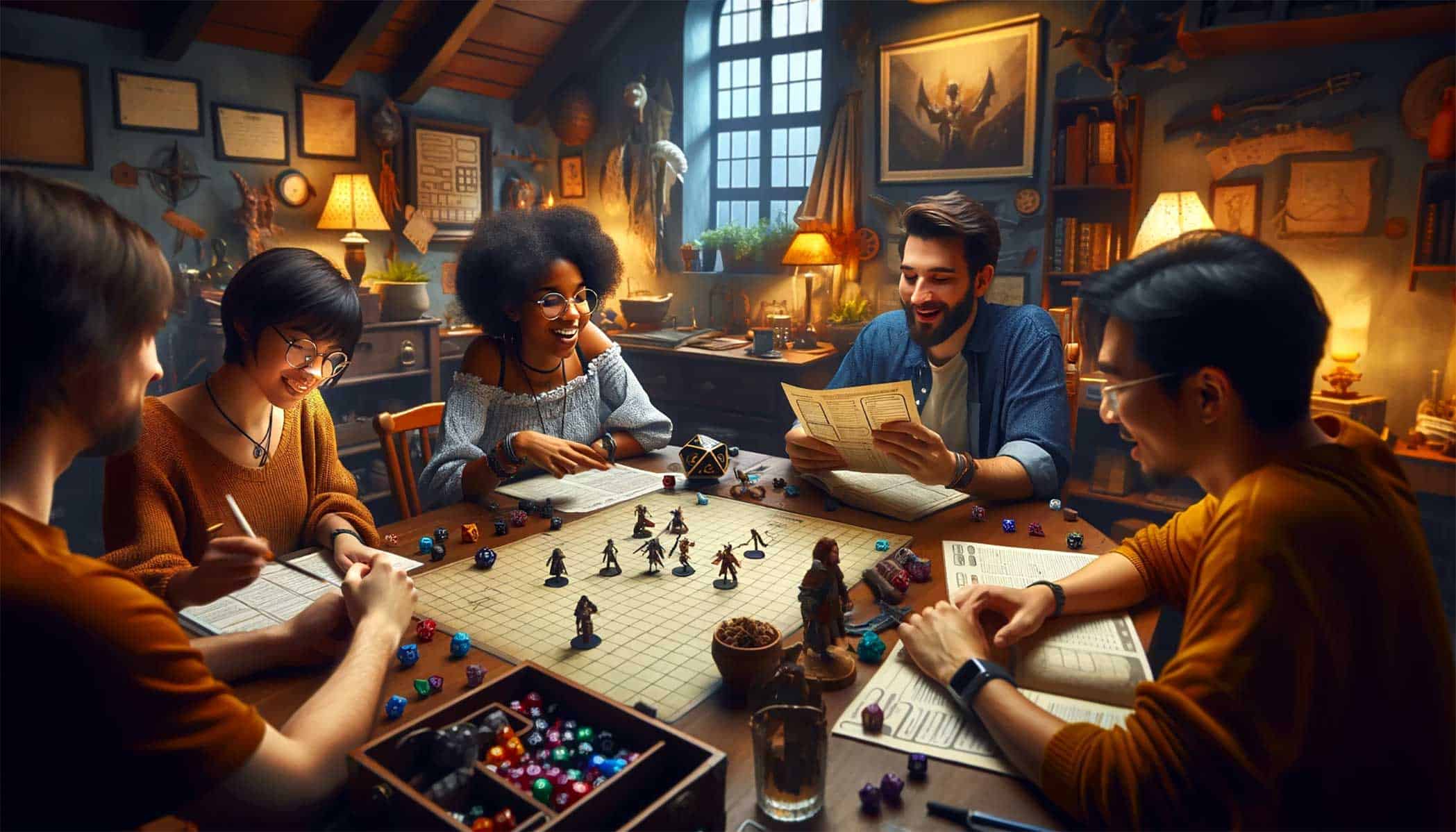Embarking on a role-playing game (RPG) adventure often starts with a fundamental, yet profound task: character creation. This initial step is more than a mere assembly of stats and skills; it’s a gateway into the psychological depth and richness of the game world. In the realm of RPGs, whether it’s Dungeons & Dragons, Pathfinder, or any other system, character creation is not just about numbers on a sheet. It’s about breathing life into a persona that extends beyond the dice and the rulebook. This article delves into the art of character creation, exploring how the choices players make in crafting their characters’ backstories, personalities, and motivations significantly influence their experience of the game and the unfolding narrative.
At the heart of every memorable RPG character lies a story, a unique blend of traits and experiences that shapes their view of the world they inhabit. This process of creation is akin to an imaginative journey where players explore different facets of themselves and the roles they wish to play. The significance of this journey is manifold: it enriches the storytelling experience, deepens the player’s connection to the game, and often reflects their own psychological complexities and desires. As we journey through the nuances of character creation, we’ll uncover how this aspect of RPGs is not just about playing a role but about understanding the depths of human psychology, empathy, and narrative. So, let us venture forth into the intricate world of character creation, where every stat and skill is a piece of a larger, more intricate puzzle of personality, backstory, and human experience.
The Art of Character Creation
In the intricate tapestry of RPGs, the art of character creation is akin to painting a portrait that comes to life, each brushstroke contributing to the depth and vibrancy of the character. This process begins with imagination, the cornerstone of any RPG experience. It’s where players envision not just the abilities and powers of their characters but also their personalities, histories, and the very essence that makes them unique. Crafting a character is not merely about selecting the right combination of stats for optimal gameplay; it’s about creating a being with hopes, fears, and dreams, a character that feels real within the fantastical realms they inhabit.
Understanding Your Character’s Motivations
A crucial aspect of character creation is delving into the backstory. What past events shaped your character’s worldview? What drives them to embark on perilous adventures? These motivations are the heartbeat of the character, propelling them forward through the campaign’s narrative. Whether it’s a personal vendetta, a quest for glory, or a deeper moral obligation, these motivations tie the character’s actions to a coherent, relatable narrative. Aligning these motivations with the goals of the campaign enhances the gameplay experience, allowing for a richer, more immersive story to unfold.
The Impact of Personality Traits
Beyond the mechanics of stats and skills lies the realm of personality traits. These traits define how a character interacts with the world and other characters, influencing decisions and relationships within the game. A character’s temperament, whether they are impulsive, cautious, compassionate, or aloof, shapes every interaction and decision. Consistency in these traits is key to maintaining the believability of the character, while allowing room for development and growth. As characters face challenges and evolve, their personalities can shift, reflecting the transformative power of their journeys and experiences.
In this process of character creation, players are not just building a set of abilities; they are weaving a narrative, a personal mythos that will guide their adventures. Each choice, from the grandest ambition to the subtlest trait, contributes to the multifaceted nature of the character, making them an integral part of the game’s storytelling tapestry. The art of character creation, therefore, is a dance between imagination and strategy, psychology and narrative, culminating in a character that is as complex and compelling as any protagonist in a grand epic.
Try my AI Tabletop RPG generators...and an extensive library of content!
The Psychological Connection
The process of character creation in RPGs is more than just a creative exercise; it’s a window into the player’s own psyche. The choices made during character creation often reflect the player’s personal experiences, desires, and subconscious aspects of their personality. This intricate connection between player psychology and character choices is what makes RPGs a deeply personal and often introspective experience.
Projection and Empathy in Role-Playing
Projection plays a significant role in character creation. Players often imbue their characters with traits they admire, aspire to, or sometimes, unconsciously relate to. This projection can manifest in various ways:
- Aspirational Traits: Players might create characters embodying qualities they wish to develop in themselves, such as bravery, wisdom, or charisma.
- Reflection of Self: Characters may reflect aspects of the player’s own personality, serving as an extension of themselves in the game world.
- Contrasting Characteristics: Some players enjoy exploring personalities vastly different from their own, as a means of experiencing new perspectives.
Empathy is another crucial element in role-playing. As players navigate their characters through the game world, they often develop a deep understanding and connection with their characters. This empathy allows players to step into their characters’ shoes, experiencing their triumphs, failures, and growth on a personal level.
⚔️ Fantasy RPG Random Tables Books
Make life as a Gamemaster easier…
If you play Dungeons & Dragons, Pathfinder, or other fantasy RPGs, this
RPG random tables series
is packed with encounters, NPCs, treasure, and more. Available in eBook or print—either way, you’ll have a wealth of adventure ideas at your fingertips.
The Therapeutic Aspects of RPGs
Role-playing games can be more than just entertainment; they can offer therapeutic benefits. Engaging in character creation and gameplay can serve as a form of escapism, self-exploration, and even a means of processing personal issues. Key aspects of this therapeutic potential include:
- Escapism: RPGs provide a safe space to escape from real-world stresses and immerse oneself in a different reality.
- Self-Exploration: Through character creation, players can explore different facets of their personality in a controlled, creative environment.
- Emotional Processing: Engaging with a character’s narrative can help players process and understand their own emotions and experiences.
Beyond the Character Sheet
In RPGs, the true essence of a character extends far beyond their stats and skills listed on the character sheet. It’s in the narrative threads woven through each session, the choices they make, and the growth they experience. This aspect of character development is crucial in creating a fulfilling and immersive RPG experience.
Integrating Character Flaws and Growth
Embracing character flaws is essential for creating a compelling narrative. These flaws not only add depth and realism to the character but also provide opportunities for growth and development. Consider these elements when thinking about character flaws and growth:
- Complex Backstories: Characters with intricate backstories often have flaws that stem from their past experiences, shaping their present actions and future growth.
- Character Arcs: As characters overcome challenges and learn from their experiences, their growth becomes a pivotal part of the story.
The Power of Dynamic Characters
Creating dynamic characters that evolve over time is one of the most rewarding aspects of RPGs. The journey of a character from a simple set of stats to a fully fleshed-out persona is a testament to the power of storytelling in RPGs. Dynamic characters are marked by:
- Evolving Motivations: As the story progresses, a character’s goals and desires may shift, reflecting their experiences and growth.
- Impact of Player Choices: The choices players make throughout the game directly influence their characters’ development, leading to unique and personalized story arcs.
In conclusion, the journey of character creation in RPGs is a deeply psychological and narrative-driven process. It’s an opportunity for players to explore aspects of themselves, craft compelling stories, and experience personal growth through the eyes of their characters. As we delve into this fascinating aspect of gaming, we not only enhance our enjoyment of the game but also discover new dimensions of our own personalities and storytelling abilities.

Conclusion
In the labyrinthine world of tabletop RPGs, character creation stands as a beacon, illuminating the depths of both the game and the gamers themselves. This journey, extending far beyond mere stats and skills, is a testament to the psychological and narrative richness that RPGs offer. We’ve traversed through various aspects of character creation, from the initial sparks of imagination to the intricate psychological connections and the narrative power of evolving characters. This process is not just about crafting a persona to navigate fictional worlds; it’s about the exploration and expression of the self.
The art of character creation in RPGs serves multiple purposes:
- Narrative Enrichment: It breathes life into the story, adding layers of depth and complexity.
- Personal Reflection: It acts as a mirror, reflecting the player’s own personality, desires, and experiences.
- Emotional Connection: It fosters a deeper emotional investment in the game, enhancing the overall experience.
- Character Growth: It provides a dynamic platform for characters to evolve, mirroring real-life growth and development.
As players, we often find ourselves lost in the mechanics and tactics of RPGs, but it’s crucial to remember that at the heart of every great adventure lies a well-crafted character. These characters are not just avatars through which we explore fantastical worlds; they are extensions of ourselves, vessels for our creativity, empathy, and personal growth. They teach us about resilience, adaptability, and the power of narrative to shape our perceptions.
In embracing the psychological aspects of character creation, we do more than play a game; we embark on a journey of self-discovery and storytelling. This journey enriches our experiences both at the table and in our daily lives, reminding us of the transformative power of imagination and narrative. So, as you roll your next character, remember that you’re not just rolling stats – you’re crafting a story, a piece of art, and a part of yourself.
Thus, the next time you sit down to create a character, consider the layers of psychology and narrative woven into the process. Embrace the complexity, the emotional depth, and the personal connection that comes with it. In doing so, you elevate your gaming experience from a mere pastime to a rich, fulfilling journey of creativity, empathy, and personal growth. Happy gaming, and may your characters live as vividly in your imagination as they do in your adventures!










